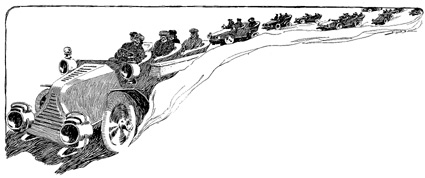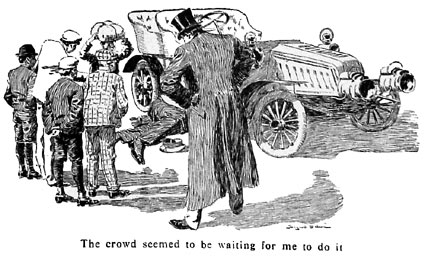| ||
| ||
from Collier's
Don't Swear!
by Ellis Parker ButlerPerkins and I sat on the veranda of one of the little roadhouses on Jerome Avenue and watched the automobiles go by. There were many automobiles, of all sorts and colors, going at various speeds and in divers manners. It was a thrilling sight -- the long rows of swiftly moving auto-vehicles running as smoothly as lines of verse all neatly punctuated here and there by an automobile at rest in the middle of the road, like a period bringing the line to a full stop. And some, drawn to the edge of the road, stood like commas. There were others, too, that went snapping by with a noise like a bunch of exclamation points going off in a keg. And not a few left a sulphurous, acrid odor like the aftertaste of a ripping Kipling ballad. I called Perkins's attention to this poetical aspect of the thing, but he did not care for it. He seemed sad. The sight of the automobiles aroused an unhappy train of thought in his mind.

Perkins is the advertising man. Advertising is not his specialty: it is his life; it is his science. That is why he is known from Portland, Maine, to Portland, Oregon, as Perkins the Great. There is but one Perkins -- a single century could never produce two such as he. The job would be too big.
"Perky," I said, "you look sad."
He waved his hand toward the procession of horseless vehicles and nodded.
"Sad!" he ejaculated. "Yes! Look at them. You are looking at them. Everybody looks at them. Wherever you go you see them -- hear them -- smell them. On every road, in every town -- everywhere -- nothing but automobiles; nothing but people looking at them -- all eyes on them. I'm sad!"
"They are beautiful," I ventured -- "and useful."
Perkins shook his head.
"Useless! Wasted! Thrown away! Look at them again. What do you see?" He stretched out his hand toward the avenue. I knew Perkins wanted me to see something I could not see, so I looked long enough to be quite sure I could not see it and then I said, quite positively:
"I see automobiles -- dozens of them."
"Ah!" Perkins cried with triumph. "You see automobiles! You see dozens of them! But you don't see an ad -- not a single ad. You see dozens of moving things on wheels that people twist their necks to stare at; you see things that men, women, and children stand and gaze upon, and not an advertisement on any of them! Talk about wasted opportunity! Talk about good money thrown away! Just suppose every one of those automobiles carried a placard with 'Use Perkins's Patent Porous Plaster' upon it! Every man, woman, and child in New York would know of Perkins's Patent Porous Plaster by this evening! It would be worth a million cold dollars! Sad? Yes! There goes a million dollars wasted, thrown away, out of reach!"
"Perkins," I said, "you are right. It would be the greatest advertising opportunity of the age, but it can't be done. Advertising space on those automobiles is not for sale."
"No," he admitted, "it's not. That's why Perkins hates the auto. It gives him no show. It is a fizzle, a twentieth-century abomination -- an invention with no room for an ad. I'm tired. Let's go home."
We settled our small account with the waiter and descended to the avenue, just as a large and violent automobile came to a full stop before us. There was evidently something wrong with the inwardness of that automobile; for the chauffeur began pulling and pushing levers, opening little cubby-holes and poking into them, turning valves and cocks, and pressing buttons and things. But he did not find the soft spot.
I saw that Perkins smiled gleefully as the chauffeur did things to the automobile. It pleased Perkins to see automobiles break down. He had no use for them. They gave him no opportunity to display his talents. He considered them mere interloping monstrosities. As we started homeward the chauffeur was on his back in the road with his head and arms under his automobile, working hard and swearing softly.
I did not see Perkins again for about four months, and when I did see him I tried to avoid him, for I was seated in my automobile, which I had just purchased. I feared that Perkins might think my purchase was disloyal to him, knowing, as I did, his dislike for automobiles; but he hailed me with a cheery cry.
"Ah!" he exclaimed. "The automobile! The greatest product of man's ingenious brain! The mechanical triumph of the twentieth century! Useful, ornamental, profitable!"
"Perky!" I cried, for I could scarcely believe my ears. "Is it possible? Have you so soon changed your idea of the auto? That isn't like you, Perky." He caught his thumbs in the armholes of his vest and waved his fingers slowly back and forth. "My boy," he said, "Perkins of Portland conquers all things! Else why is he known as Perkins the Great? Genius, my boy, wins out. Before genius the automobile bows down like the camel and takes aboard the advertisement. Perkins has conquered the automobile!"
I looked over my auto carefully. I had no desire to be a traveling advertisement even to please my friend Perkins. But I could observe nothing in the promotion and publicity line about my automobile. I held out my hand. "Perkins," I said heartily, "I congratulate you. Is there money in it?"
He glowed with pleasure. "Money?" he cried. "Loads of it. Thousands for Perkins -- thousands for the automobile makers -- huge boom for the advertiser. Perkins put it to the auto makers like this: 'You make automobiles. All right. I'll pay you for space on them. Just want room for four words, but must be on every automobile sent out. Perkins will pay well.' Result -- contract with every maker. Then to the advertiser: 'Mr. Advertiser, I have space on every automobile to be made by leading American factories for next five years. Price, $100,000!' Advertiser jumped at it! And there you are!"
I do not know whether Perkins meant his last sentence as a finale to his explanation or as a scoff at my automobile. In either case I was certainly "there," for my auto took one of those unaccountable fits and would not move. I dismounted and walked around the machine with a critical, inquiring eye. I poked gingerly into its ribs and exposed vitals; lifted up lids; turned thumbscrews and shook everything that looked as if its working qualities would be improved by a little shaking, but my automobile continued to balk.
A few small boys suggested that I try coaxing it with a lump of sugar or building a fire under it, or some of the other remedies for balking animals, but Perkins merely stood by with his hands in his pockets and smiled. He seemed to be expecting something.
I am not proud, and I have but little fear of ridicule, but a man is only human. Fifth Avenue is not exactly the place where a man wishes to lie on the flat of his back. To be explicit, I may say that when I want to lie on my back in the open air I prefer to lie on a grassy hillside with nothing above me but the blue sky rather than on the asphalt pavement of Fifth Avenue with the engine room of an automobile half a foot above my face.
Perkins smiled encouragingly. The crowd seemed to be waiting for me to do it. I felt, myself, that I should have to do it. So I assumed the busy, intense, oblivious, hardened expression that is part of the game, and lay down on the top of the street. Personally I did not feel that I was doing it as gracefully as I might after more practice, but the crowd were not exacting. They even cheered me, which was kind of them; but it did not relieve me of the idiotic sensation of going to bed in public with my clothes on.

If I had not been such an amateur I should doubtless have done it better, but it was disconcerting, after getting safely on my back, to find that I was several feet away from my automobile. I think it was then that I swore, but I am not sure. I know I swore about that time, but whether it was just then, or while edging over to the automobile, I cannot positively say.
I remember making up my mind to swear again as soon as I got my head and chest under the automobile, not because I am a swearing man, but to impress the crowd with the fact that I was not there because I liked it. I wanted them to think I detested it. I did detest it. But I did not swear. As my eyes looked upward for the first time at the underneath of my automobile I saw this legend painted upon it: "Don't Swear; Drink Glenguzzle."
Peering out from under my automobile I caught Perkins's eye. It was bright and triumphant. I looked about, and across the avenue I saw another automobile standing.
As I look back I think the crowd may have been justified in thinking me insane. At any rate they crossed the avenue with me and applauded me when I lay down under the other man's automobile. When I emerged they called my attention to several other automobiles that were standing near, and were really disappointed when I refused to lie down under them.
I did refuse, however, for I had seen enough. This automobile also bore on its under side the words: "Don't Swear; Drink Glenguzzle"; and I was willing to believe that they were on all the automobiles.
I walked across the avenue again and shook hands with Perkins. "It's great!" I said enthusiastically.
Perkins nodded. He knew what I meant. He knew I appreciated his genius. In my mind's eye I saw thousands and thousands of automobiles, in all parts of our great land, and all of them standing patiently while men lay on their backs under them, looking upward and wanting to swear. It was a glorious vision. I squeezed Perkins's hand.
"It's glorious!" I exclaimed.
www.ellisparkerbutler.info
Saturday, October 07 at 5:22:48am USA Central